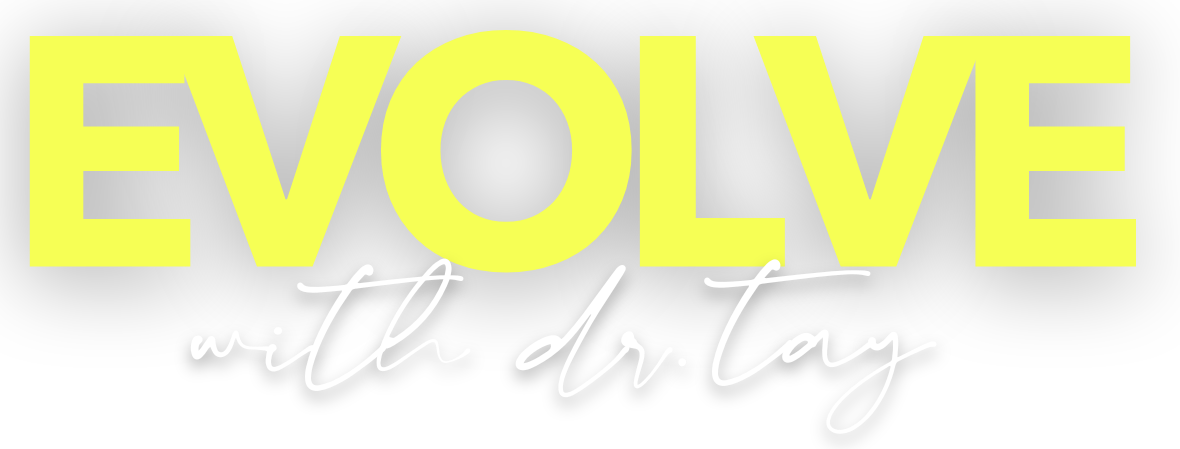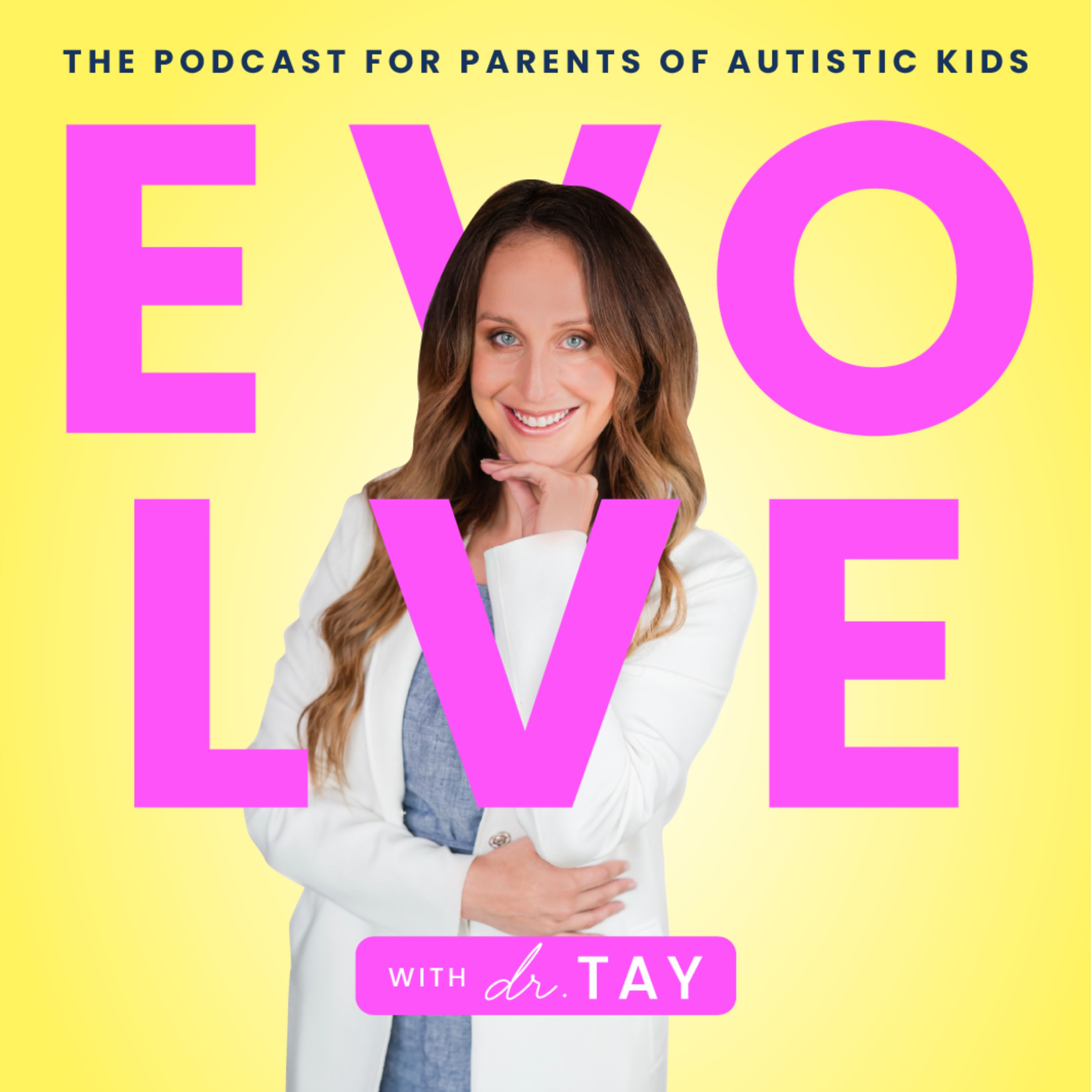full
49 | how to pivot when things don't go according to plan
in this mini episode, Dr. Tay discusses that even with the best preparation that some things may not go according to plan. emphasis is placed on how to manage emotions when plans change and the significance of giving space for feelings without guilt or blame. a focused discussion on how to support siblings of autistic children occurs.
RESOURCES
⚡️ join the Evolve Facebook community to participate in the episode Q+As >> facebook.com/groups/evolveautism
⚡️ learn from me and submit your questions [could be featured on a future episode] >>
⚡️ want to learn more about Dr. Tay's Whole Family Approachᵀᴹ and current services offered? schedule a free consult call here or email admin@drtaylorday.com if you have questions.
DISCLAIMER >> anything shared on this podcast should not be considered clinical advice, and you should consult with your team of medical, mental health, and developmental providers if you need support.
Transcript
Welcome to a parenting space actually designed for you where you
Speaker:can get answers about navigating a life that includes autism.
Speaker:I'm Dr.
Speaker:Tay, and today I have a mini episode just for you.
Taylor:Hi y'all.
Taylor:So in today's mini episode, we are going to talk about what happens when
Taylor:things don't go according to plan.
Taylor:So this episode actually was inspired by the 4th of July, which
Taylor:was a little over a week ago.
Taylor:When I'm recording this, depending when the episode gets posted, it would've
Taylor:been a little bit ago, but this idea of taking your family to a 4th of July
Taylor:event, maybe there's fireworks and your autistic child is really struggling
Taylor:and maybe you can't stay as long as you wanted to, or you have to pack
Taylor:up and leave, or there's a meltdown and that's really hard to navigate
Taylor:Or you're having to tell your non-autistic children, no, all
Taylor:different sorts of scenarios.
Taylor:how do you navigate those situations as a family?
Taylor:And so first off, I want to emphasize that even with the best preparation, things
Taylor:may not go according to plan, And so I.
Taylor:give you permission to let go of some of this burden that if things don't
Taylor:go according to plan, that means you did something wrong, I want you to
Taylor:keep in mind everything is a learning experience and it's gonna allow you
Taylor:to fine tune processes for next time.
Taylor:And yes, we know for many autistic children that the idea of
Taylor:preparation can be really helpful.
Taylor:This can look like things like visual schedules, like actually telling them
Taylor:what order things are happening in and going over that over and over again.
Taylor:It could also look like a social story in this.
Taylor:Doesn't need to be elaborate.
Taylor:You always can go on the internet, like 4th of July, for example, would
Taylor:be a common one where I guarantee you can find a social story that's already
Taylor:written or going to the doctor's office, But you also might have more.
Taylor:Specific things to your family, and it doesn't need to be really elaborate.
Taylor:One way to create a visual schedule or a social story in a really simplified way
Taylor:is that if something is changing in your child's routine, you might just either
Taylor:Google pictures of what is changing, or maybe you drive by something and take a
Taylor:picture, take different screenshots, and then what I want you to do is put them
Taylor:into an album on your phone and you can sit down with your child and be like,
Taylor:okay, so this is what's gonna happen.
Taylor:Talk them through it.
Taylor:And so that's the idea of preparation.
Taylor:But the more we can have these visual aids, often autistic children
Taylor:are very strong visual processors, number one, but number two, then
Taylor:they can keep going back through this and have those reminders as well.
Taylor:Or if you're getting ready to leave or transition to something and giving them
Taylor:a timer warning can be super helpful.
Taylor:Like, Hey, five minutes.
Taylor:And then having a visual with a timer can be awesome.
Taylor:But there's gonna be times that it still goes rough.
Taylor:Or you might even think through plans and preparations in terms of
Taylor:thinking about their sensory needs.
Taylor:What fidgets are you packing?
Taylor:are headphones being packed?
Taylor:maybe it's like a day at the beach, do you have an umbrella that they
Taylor:can sit under to cool down in a fan?
Taylor:Thinking through some of these things that Are sensitivities for your
Taylor:child and being able to accommodate those again, you're gonna do that
Taylor:and it's gonna fail sometimes.
Taylor:And so that's what I want you first and foremost to hear in this
Taylor:episode, is releasing the burden that if it fails, that means you
Taylor:did something wrong A lot of times.
Taylor:Parents that I have worked with find this intense guilt that they did something
Taylor:wrong, that there was a misstep.
Taylor:And a lot of times we can't predict, different things happening.
Taylor:There are things that are absolutely out of control too, if you're going
Taylor:to do an out outdoor activity, which I feel like outdoor activities are on
Taylor:my mind because it's summer right now.
Taylor:But if you're going to do an Outdoor activity and it rains.
Taylor:That's completely out of your control.
Taylor:And so say a situation happens like that,
Taylor:And your child is very distressed, that ultimately things
Taylor:didn't go according to plan.
Taylor:So let's actually talk about now how do you recover from this?
Taylor:But I wanted you to hear you're not gonna get everything perfect.
Taylor:First and foremost, and it is a learning experience.
Taylor:You can use that data for future events, but also just realize like there
Taylor:are so many factors and you are not gonna be able to control everything.
Taylor:And so what I really want you to focus on is what are those
Taylor:things that you can control?
Taylor:Focus on those and things going not according to plan is not something
Taylor:that you have any control over.
Taylor:And also, If something goes out of control, I want you to respond by
Taylor:not going into instant blame mode.
Taylor:That is not gonna help this situation.
Taylor:So other ways that you can respond and recover from this first off is
Taylor:validating your autistic child's feelings.
Taylor:there is a way, like with this rain example of.
Taylor:I, I understand.
Taylor:I'm really upset too right now.
Taylor:and then you can propose an alternate, activity potentially, or you just
Taylor:might sit with those feelings like, yeah, it's okay to cry.
Taylor:Let's sit here and cry together.
Taylor:That is allowing your child to experience what they're experiencing.
Taylor:You can't fix it, you're not gonna stop the rain and all of a sudden
Taylor:have this activity start again.
Taylor:So how can you be present with your autistic child in that moment?
Taylor:And also the more you can model that emotions are normal as
Taylor:part of this, that that is okay.
Taylor:It is okay though, and necessary oftentimes to say it is
Taylor:okay to be upset right now.
Taylor:And we can't hit your sister, and then maybe you're giving them an
Taylor:activity to keep their hands busy.
Taylor:maybe there's something that's really regulating, Hey, you have
Taylor:really big feelings right now.
Taylor:I get really big feelings too.
Taylor:Let's go swing on your sensory swing.
Taylor:So giving that replacement behavior when it's something that's not within your
Taylor:family rules of ways for them to expect.
Taylor:Express their emotions, but expressing their emotions is
Taylor:a thousand percent acceptable.
Taylor:And that is exactly it is.
Taylor:That is true of your whole family.
Taylor:So with your non-autistic children, or maybe even other autistic children,
Taylor:or neurodivergent children in the family whose plans are affected by the
Taylor:autistic child, you wanna make sure that there's not this blame game coming up.
Taylor:Oh, we gotta go home because of Bobby.
Taylor:We gotta go home because Sally had a meltdown.
Taylor:We gotta go home because Angelica, Can't handle this.
Taylor:So what that means, the blame game first.
Taylor:Making sure you are not modeling that, that it isn't the reason that you
Taylor:have to leave a situation or anything.
Taylor:that there isn't this like accusatory aspect on your autistic child.
Taylor:And I know you don't mean that intentionally, but we think
Taylor:about from a modeling standpoint, if your children hear you.
Taylor:Quote unquote saying that their autistic sibling is the
Taylor:reason that you need to leave.
Taylor:They're gonna model that behavior.
Taylor:And so instead you can say something like, George is really overstimulated
Taylor:right now, and when any of us get overstimulated, we come together as a
Taylor:family, and that means sometimes we have to do things that make us sad or upset.
Taylor:Do you see that there's a nuance there?
Taylor:You can explain the situation, but we don't want to link.
Taylor:The reason of having to leave be related to your autistic child.
Taylor:I actually had a very real life example come up with this, and it wasn't
Taylor:necessarily about leaving, but I have an autistic toddler that I see in
Taylor:their classroom, and the teachers were.
Taylor:Finding that this child was overstimulated by the loud noise.
Taylor:And I loved the receptivity to that.
Taylor:But what was happening is they were saying, I'm gonna make
Taylor:up a fake name for this child.
Taylor:so we'll call this child Charlie, and they were saying, everyone you need to quiet
Taylor:down Because it's too loud for Charlie.
Taylor:And so it was interesting.
Taylor:I was in the classroom.
Taylor:I went and had a conversation with the mom about it.
Taylor:Very open dialogue of here's what's happening, how do you feel about that?
Taylor:And the mom made some amazing points.
Taylor:She was like, I don't want my child to be the reason that they have to quiet down.
Taylor:They need to learn how to quiet down themselves.
Taylor:And it was like, yeah, they gotta learn for many different reasons
Taylor:that that's part of classroom rules.
Taylor:And so while I really appreciated the teacher's awareness to support this child,
Taylor:ultimately there was this blame game.
Taylor:We have to be quiet because of Charlie, and that isn't fair to Charlie.
Taylor:Instead, it's, Hey, it's too loud in the classroom.
Taylor:Let's quiet down.
Taylor:That's all that it ultimately takes, So overall, being careful of how you
Taylor:explain the reason, can we simplify it?
Taylor:Can we remove that?
Taylor:The reason this, this quote unquote bad thing happened is because of your
Taylor:autistic child And also then, Validating your other children's emotions.
Taylor:I know you were really sad to leave.
Taylor:I, I understand And you can even say things if they're reasonable
Taylor:and age appropriate and true things like, yeah, I was sad to leave too.
Taylor:in my opinion, it's okay to say things like, sometimes for, for your sister, she
Taylor:gets overwhelmed and we wanna make sure that everyone is happy in that situation.
Taylor:That, again, has a very different, perspective than we had to
Taylor:leave because of your sister.
Taylor:And you might even help build some of your other children's awareness of
Taylor:like, Yeah, when you're uncomfortable, we would leave for you too.
Taylor:And sometimes for your sister, we do have to leave more often.
Taylor:And as a parent, I'm trying to figure out ways to really support
Taylor:your sister through all of this.
Taylor:Do you have any ideas which also invites them into the
Taylor:conversation and that collaboration.
Taylor:And the other thing that I wanna keep, And mine is, you are going to
Taylor:have emotions in all of this too.
Taylor:Like I said at the start of the episode is releasing some of the blame and
Taylor:guilt that you're gonna naturally put on yourself, but also being mindful
Taylor:of you're gonna feel really split.
Taylor:You're gonna feel like.
Taylor:It was the right thing to do because you needed to support your
Taylor:autistic child in that moment.
Taylor:you also might be really embarrassed, for example, if your child has a tantrum or
Taylor:a meltdown in public, and that's normal.
Taylor:That would be to be expected.
Taylor:Again, I said this so many times on the podcast, but you are human and humans
Taylor:have emotions, and so shaming ourselves for the emotions isn't gonna make them go
Taylor:away and isn't gonna make you feel better.
Taylor:It is ultimately realizing that you can practice acceptance of
Taylor:your emotions and still love your autistic child unconditionally.
Taylor:So be aware of your own emotions in this.
Taylor:So this split of you feel like you supported your autistic child, but
Taylor:maybe you disappointed your, your non-autistic children or the autistic
Taylor:child's siblings, it's okay to feel both.
Taylor:It's the power of, and both of those things can co-occur.
Taylor:And also we don't have to react to disappointment by
Taylor:trying to fix the situation.
Taylor:Sometimes what kids need the most is a space to feel their feelings.
Taylor:And what we actually find is kids are really, really resilient.
Taylor:Often if you can validate their emotions, they're pretty quickly onto the next
Taylor:thing, but they know that their emotions are allowed in in your home, in your
Taylor:space, and that feels good for them.
Taylor:And lastly, I want you to keep in mind though that these
Taylor:emotions might not be outward.
Taylor:Just like you have learned to suppress your emotions, your
Taylor:other children may have learned to suppress their emotions too.
Taylor:And this is all your children.
Taylor:In one way, this might not be outward for your autistic child, is they might
Taylor:not show emotions in these neurotypical ways, with facial expressions, with
Taylor:expressing it, That's important to keep in mind, but also sometimes,
Taylor:And I experienced this as a kid.
Taylor:No one told me I needed to do this, but I knew my brother needed help and I felt
Taylor:like he needed more help than I did.
Taylor:And so I learned to push down my disappointment.
Taylor:I don't remember if we talked about this on the episode with my mom But
Taylor:here's the thing I don't remember this.
Taylor:My mom was actually telling me a story she remembered of, I was on
Taylor:the rowing team in high school, in college, and I had this big race and
Taylor:My mom wasn't able to come to this race and she had called me and shared
Taylor:she wasn't able to, and apparently I told her, oh, it's totally fine.
Taylor:It's not a big deal.
Taylor:But then another parent saw me crying next to a car because
Taylor:it was a big deal in my world.
Taylor:And listen, I understood that my brother needed her more in that
Taylor:moment, but that doesn't also mean that I didn't have feelings in this.
Taylor:So keep that in mind.
Taylor:For the siblings of your autistic child is that they might not tell you
Taylor:they need the space to process their feelings, but provide that for them.
Taylor:Invite them to, to be able to share that.
Taylor:And sometimes they might be like, no, I'm fine.
Taylor:Okay.
Taylor:Just know that if you start to feel any emotions, we can talk about those.
Taylor:And that feels supportive in and of itself.
Taylor:All right y'all, that is a wrap for today's episode, and I
Taylor:hope you got value out of this.
Taylor:I think the biggest piece is knowing that plans aren't gonna always go according to
Taylor:plan, no matter how much you prep and plan for it, that things are going to happen.
Taylor:They can be learning experiences, but making sure that you are
Taylor:not blaming yourself when things don't go according to plan.
Taylor:And then the biggest piece is allowing everyone to experience
Taylor:their emotions and reaction to this.
Taylor:All right.
Taylor:I'll be back for another episode soon.
Taylor:Bye y'all.
Taylor:This episode was meant to be short and sweet, full-length episodes, air
Taylor:every Wednesday with many episodes like this sprinkled in between.
Taylor:So subscribe now so you don't miss the next one.
Taylor:And if you wanna inspire a future episode, because that's how we roll
Taylor:over here, ask me a question on any of my social media pages for a chance to
Taylor:have your question featured by y'all.


